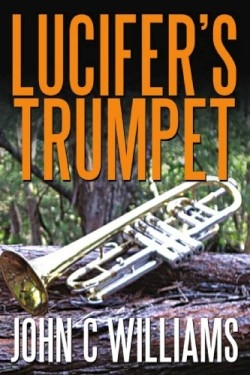Lucifer's Trumpet
The roaring twenties might shine with some glamour from the vantage point of 2009, but certainly temporal distance has laid a false gloss over that tumultuous, dangerous period of time. John C. Williams explores the dark underside of a decade during which gangsters seemed almost heroic, wielding hefty revolvers in their big shiny cars.
Samuel Wilde experiences the danger firsthand when he accepts a job offer from a man in a bar in his small Canadian hometown. He travels to Seattle to work as an office boy for Milo DeAngelo, a crook disguised as a fish broker, and is soon promoted to riskier jobs like transporting prohibited alcohol.
To complicate his already precarious situation, Samuel falls in love with Milo’s office manager, Nikki, a Hungarian immigrant with a son and a sordid history that Samuel can’t get her to reveal. Pulling on his other arm is Mary, a girl from his hometown who has come to Seattle to help a sick sister care for her baby. Samuel’s life erupts into a storm of deception and murder when two U.S. Marshals pressure him into betraying his boss. One by one, the people he trusted end up dead or pointing a gun at his own head.
The novel’s opening leaves readers helpless against the pull of the drama. “At the crack of timber, the ceiling fell in and twenty-two-year-old Samuel Wilde dove for cover of the empty coal car,” Williams writes. “He rolled into a ball as chunks of limestone and coal began to cement him beneath the wheels.”
The momentum of the story carries the reader through most of the novel, but it falters toward the end when the climax seems to be continuously delayed. Williams insinuates several times that a major event is about to take place, but the suspense lags as Samuel returns to his hotel room for a nap or gets a bite to eat. By spreading the somewhat hazy final events of the story out over a couple of days, Williams loses the tension he created in the first part of the book.
The characters in Lucifer’s Trumpet are more fluid and contradictory than people tend to be. For example, Mary has a personality that swings wildly from demure to overtly sexual, and back to demure. Nikki also changes moods within moments. Williams uses his characters as props to explain his plot rather than allowing the story to organically grow out of the men and women who populate his novel.
Rum-running, chemical warfare, immigration policy, the dangers of drug addiction—Williams includes it all in Lucifer’s Trumpet. Despite a few textual problems, this novel is a good one to keep in the beach bag to read on a long summer day.
Reviewed by
Andi Diehn
Disclosure: This article is not an endorsement, but a review. The publisher of this book provided free copies of the book and paid a small fee to have their book reviewed by a professional reviewer. Foreword Reviews and Clarion Reviews make no guarantee that the publisher will receive a positive review. Foreword Magazine, Inc. is disclosing this in accordance with the Federal Trade Commission’s 16 CFR, Part 255.

